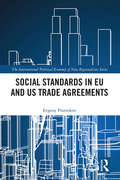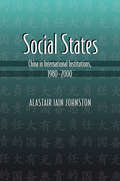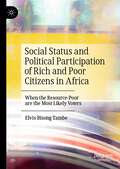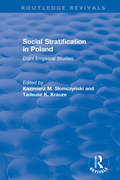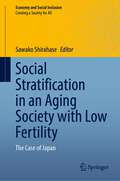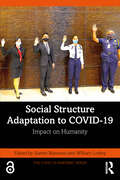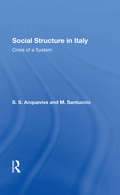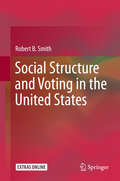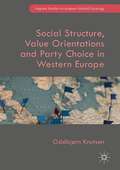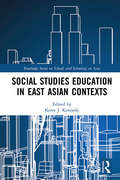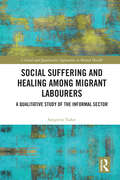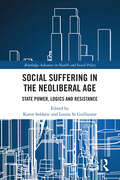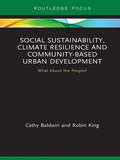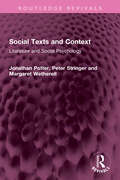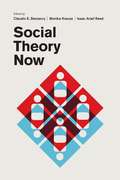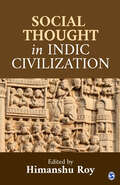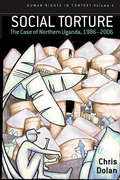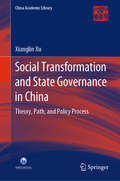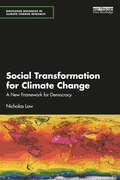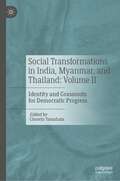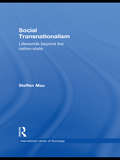- Table View
- List View
Social Standards in EU and US Trade Agreements (The International Political Economy of New Regionalisms Series)
by Evgeny PostnikovThis book examines the causes and consequences of social standards in US and EU preferential trade agreements (PTAs). PTAs are the new reality of the global trading system. Pursued by both developed and developing countries, they increasingly incorporate labor and environmental issues to prevent a race to the bottom in social regulation and counter-protectionism. Using principal-agent theory to explore why US PTAs have stricter social standards than those signed by the EU, Postnikov argues that the level of institutional insulation of trade policy executives from interest groups and legislators determines the design of social standards. In the EU, where institutional insulation is high, social standards mirror the normative preferences of the European Commission leading to a softer approach. In the US, where such insulation is low, social standards are driven by interest groups and legislators they control, resulting in a stricter approach. This book shows that both approaches can be effective but work through different causal mechanisms. To test his argument, Postnikov draws on original data collected in Brussels, Washington, Santiago, Bogota, and Seoul. This book will be of interest to all scholars and students working in the fields of international political economy and EU and US trade policy.
Social States: China in International Institutions, 1980-2000
by Alastair Iain Johnston"Constructive engagement" became a catchphrase under the Clinton administration for America's reinvigorated efforts to pull China firmly into the international community as a responsible player, one that abides by widely accepted norms. Skeptics questioned the effectiveness of this policy and those that followed. But how is such socialization supposed to work in the first place? This has never been all that clear, whether practiced by the Association of South East Asian Nations (ASEAN), Japan, or the United States. Social States is the first book to systematically test the effects of socialization in international relations--to help explain why players on the world stage may be moved to cooperate when doing so is not in their material power interests. Alastair Iain Johnston carries out his groundbreaking theoretical task through a richly detailed look at China's participation in international security institutions during two crucial decades of the "rise of China," from 1980 to 2000. Drawing on sociology and social psychology, this book examines three microprocesses of socialization--mimicking, social influence, and persuasion--as they have played out in the attitudes of Chinese diplomats active in the Conference on Disarmament, the Comprehensive Nuclear Test Ban, the Convention on Conventional Weapons, and the ASEAN Regional Forum. Among the key conclusions: Chinese officials in the post-Mao era adopted more cooperative and more self-constraining commitments to arms control and disarmament treaties, thanks to their increasing social interactions in international security institutions.
Social Status and Political Participation of Rich and Poor Citizens in Africa: When the Resource-Poor are the Most Likely Voters
by Elvis Bisong TambeThis book seeks to explore a fundamental obscurity in electoral behavior literature: while socioeconomic status is typically robustly and positively associated with a higher propensity for voting worldwide, the relationship in Africa is either negative or non-existent. Building upon the author’s previous works relating to political participation, behavior and electoral processes, this work focuses specifically on 35 sub-Saharan African political system case studies and analyzes why resource-poor Africans tend to display greater electoral participation than their more comparatively affluent counterparts. Drawing from a methodological–theoretical framework utilizing Afrobarometer data and group mobilization theories such as the civic voluntarism model, electoral clientelism, democratic quality, preference theory and institutional perspectives, this book makes an original contribution to analyzing African regions less well-examined in existing comparative participatory political science literatures.
Social Stratification in Poland: Eight Empirical Studies (Routledge Revivals)
by Kazimierz M. Slomczynski Tadeusz K. KrauzeThe American press and American television news have been filled with stories from Gdansk, Warsaw, Krakow, Lódz, and other Polish cities and towns. The names of a number of Polish leaders have become almost as familiar to Americans as the names of their own leaders, and the word " Solidarity" has acquired an important new meaning for Americans as well as Poles. The editor's identify that this interest of the American public has not been matched by corresponding interest from American sociologists, stating that Polish society is seldom mentioned either in major scholarly journals or in the textbooks written for students. This collection of studies seeks to address some of this issue, looking at works and the systems in Poland since 1956.
Social Stratification in an Aging Society with Low Fertility: The Case of Japan (Economy and Social Inclusion)
by Sawako ShirahaseThis edited book empirically discusses stratification in contemporary Japanese society. It is unique for its examination of social inequality in relation to declining fertility and an aging population. Japan is the most aged society in the world: according to the Statistics Bureau of Japan, people who are aged 65 and above comprised 29.1% of the country’s total population in 2021. Meanwhile, the fertility rate has continuously declined since the mid-1970s. Japan experienced a dramatic change in its demographic structure in a short period of time. Such fast change could be a major factor that generated social stratification. In her industrialization, Japan was thought to share a pattern of social stratification similar to that of developed European and North American countries but with a low degree of socio-economic inequality and a high degree of homogeneity. There is no clear support for this description of Japan, although the country does share a pattern and degree of social stratification similar to that observed in Europe and North America. The social stratification theory has been developed in close relationship to the labor market; however, it is necessary to further examine the social stratification of very aged societies in which a substantial number of the population—namely, retired persons—no longer have any ties to the labor market. In this book, the contributors explore the pattern of social stratification at three life stages: young, middle-aged, and elderly. Included are discussions of various aspects of stratification such as education, work, wealth, marriage, family, gender, generation, and social attitudes.
Social Structure Adaptation to COVID-19: Impact on Humanity (The COVID-19 Pandemic Series)
by Suresh Nanwani William LoxleySocial Structure Adaptation to COVID-19 offers global, interdisciplinary perspectives that examine how the COVID-19 pandemic has altered the development trajectory of schools, public health, the workforce, and technology adoption. It explores social themes in society, economy, policy, and culture and draws on a social framework to describe key functions of societal adaptation to the pandemic.Edited by Suresh Nanwani and William Loxley, the volume is grounded in the study of system components and their objectives to improve overall well-being given the ill effects of the COVID-19 pandemic. Chapters explore interconnected social networks and how sectors restructured themselves to stabilize or transform society. International contributors from 20 countries offer case studies that highlight key themes including personal connectivity, societal equality, well-being, big data, and national resilience. They predict how impactful the pandemic might be in reshaping the future and assess how the COVID-19 pandemic has affected school system shutdown, public health collapse, business closures, public policy failure, and technology-driven social media acceleration.Offering insights into how institutions and sectors work together in times of crisis, and how COVID-19 has restructured social behavior, Social Structure Adaptation to COVID-19 will be valuable reading for scholars and students of sociology, political science, anthropology, comparative international development, psychology, and education. It will also be of interest to policymakers concerned with education, work and organizations, and media and technology.The Open Access version of this book, available at www.taylorfrancis.com, has been made available under a Creative Commons Attribution-Non Commercial-No Derivatives (CC-BY-NC-ND) 4.0 international license.
Social Structure In Italy: Crisis Of A System
by Sabino AcquavivaThis book demonstrates that twentieth century social stratification and the distribution of political and economic power in Italy cannot be properly understood without carefully analyzing the historical dynamics of the development of Italian society. This analysis is also needed to explain the woeful economic, and governmental and administrative performance of the strata that finally reached the levers of power. The Italian society and social and political system are in a crisis: development is uneven and the bureaucratic structures are in shambles. The roots of this crisis lie in the endemic underdevelopment typical of the second half of the nineteenth century. Clearly, they cannot be attributed to the historic failures of Fascism, Democracy, Catholicism or Marxism in Italy, but they are the outcome of a long history of underdevelopment followed by extremely uneven regional evolution leading to tremendous cleavages between ultra-modern and utterly antiquated phenomena, the juxtaposition of flexibility and rigidity, of optimistic enthusiasm and hidebound traditionalism, of extreme wealth and abysmal poverty, of high and low levels of earnings, and of a maladjusted, ill-functioning, uneasy combination of agricultural, industrial, and post-industrial society. All this is aggravated by the crisis in the church and by the North-South situation in which many millions of people have migrated from the South to the North, and by the ensuing struggle between a mass of lumpen proletarians and proletarian immigrants from the South, who are exploited as a work force for the industrial development of the North.
Social Structure and Voting in the United States
by Robert B. SmithThis bookanalyzes practical and moral influences on voting decisions. Undermining the widespreadassumption that economic self-interest is the key determinant of voting choices,it discovers that moral considerations rooted in religious traditions are oftenthe more decisive. This finding is confirmed through a close analysis oftangible problems, such as child neglect and crime, problems which one wouldexpect to trouble practical voters. Further, this book suggests that politicalideologies influence party affiliation, rather than the other way around. It definesfour categories of states in terms of human development and income equality--South,Heartland, postindustrial, and "balanced. " It then explains why politicalcolor (red, purple, or blue) and societal problems vary across thesecategories. Voters' moral ideologies, itshows, combine with a state's measure of income equality and human development toshape a state's readiness to pursue practical solutions to societal problems. Finally, it shows that moral ideologiesof the religious right and authoritarianism, two very different concepts, are in fact intertwined empirically. This book thus suggests that education--a keydriver of human development, anti-authoritarianism, and deliberative voting--shouldbegin in preschools that are both nurturant and instructive.
Social Structure, Value Orientations and Party Choice in Western Europe (Palgrave Studies in European Political Sociology)
by Oddbjørn KnutsenThis book analyses the impact of socio-structural variables, such as social class, religion, urban/rural residence, age and gender, on influencing an individual’s voting preferences. There have been major changes in recent decades both to social structure and how social structure determines people’s voting behaviour. There has also been a shift in value orientations, for example from religious to secular values and from more authoritarian to libertarian values. The author addresses the questions: How do social structure and value orientations influence party choice in advanced industrial democracies?; To what extent is the impact of social structure on party choice transmitted via value orientations?; To what extent is the impact of value orientations on party choice causal effects when controlled for the prior structural variables? The book will be of use to advanced students and scholars in the fields of comparative politics, electoral politics and political sociology.
Social Studies Arkansas Studies (Liberty Edition)
by Houghton Mifflin CompanySocial Studies textbook for 4th Grade
Social Studies Education in East Asian Contexts (Routledge Series on Schools and Schooling in Asia)
by Kerry J. KennedyThe book explores the state of social studies education within selected East Asian societies and provides some insights into distinctive classroom practices. In an increasingly volatile and unpredictable world, the education of young people who both understand the contexts in which they are growing up and see the need for engaging with them is a top priority. This task falls to social studies education which carries the responsibility for inducting young people into their social world and helping them to see the role they can play within it. This is particularly important in East Asia where strong economic growth, long held cultural values and diverse political systems create an environment that challenges young people on multiple fronts. This book, with its team of regional authors, shows how different societies in the region are dealing with these challenges and what can be expected from future citizens. The book will appeal to policy makers, researchers and teachers interested in the current state of social studies education in East Asian societies.
Social Studies Wisconsin
by Scott ForesmanSocial Studies textbook for elementary students in Wisconsin.
Social Suffering and Healing among Migrant Labourers: A Qualitative Study of the Informal Sector (Critical and Qualitative Approaches to Mental Health Experiences among Vulnerable Groups)
by Sangeeta YadavThe book uncovers the nuances of the lives of unskilled migrant labourers in India. The qualitative approach, along with the social constructivist paradigm and ethnographic fieldwork demonstrates the nature of scientific inquiry carried out in this work. The data analysis methods supporting the narratives will not only help readers understand the experiences of the migrant communities but will also facilitate a bond of empathy with the participants.Taking a bottom-up approach, the book explores how migrant labourers’ suffering, and their sense of wellbeing are deeply embedded in their existing surroundings. It throws light on the numerous communities across the world that are at high risk of developing mental health related problems due to existing socio-political conditions.The book will be useful to the students, researchers, and teachers of Sociology, Social Work, Anthropology, Psychology, Political Science, Economics, Public Policy and Administration. It will be especially be useful to mental health professionals, social workers and NGOs engaging with migrant or other marginalized communities.
Social Suffering in the Neoliberal Age: State Power, Logics and Resistance
by Karen Soldatic Louise St GuillaumeThis book provides a rich synthesis of research and theory of nascent and emergent critically engaged work examining changing welfare structures, regimes and technologies and the social suffering that is generated in everyday lives. By rigorously examining social security restructuring with the turn to austerity governance and its daily practices of managing, regulating and subordinating individuals, peoples and communities, this collection delineates the machinery of state power and logics designed to manage, contain and control the lives of some of the most poorest and marginalized citizens who are reliant on social welfare income payments. A core strength of the book is first, its unpacking of austerity governance across diverse communities and, second, the elevation of community resistance and mobilization against the very measures of austerity. Combined, the work maps out the logics of state power and everyday practices of embedded contestation and confrontation. Using the case-study of Australia to discuss socio-legal re-categorisations, automation of welfare governance, technologies of policy design and delivery, conditionality and systems of penalisation, this book will be of interest to all scholars and students of sociology, critical theory, social policy, social work and disability studies, Indigenous studies and settler colonialism.
Social Sustainability, Climate Resilience and Community-Based Urban Development: What About the People? (Routledge Focus on Environment and Sustainability)
by Cathy Baldwin Robin KingUrban communities around the world face increased stress from natural disasters linked to climate change, and other urban pressures. They need to grow rapidly stronger in order to cope, adapt and flourish. Strong social networks and social cohesion can be more important for a community’s resilience than the actual physical structures of a city. But how can urban planning and design support these critical collective social strengths? This book offers blue sky thinking from the applied social and behavioural sciences, and urban planning. It looks at case studies from 14 countries around the world – including India, the USA, South Africa, Indonesia, the UK and New Zealand – focusing on initiatives for housing, public space and transport stops, and also natural disasters such as flooding and earthquakes. Building on these insights, the authors propose a 'gold standard': a socially aware planning process and policy recommendation for those drawing up city sustainability and climate change resilience strategies, and urban developers looking to build climate-proof infrastructure and spaces. This book will be of great interest to students and scholars of urban studies, resilience studies and climate change policy, as well as policymakers and practitioners working in related fields.
Social Texts and Context: Literature and Social Psychology (Routledge Revivals)
by Jonathan Potter Margaret Wetherell Peter StringerFirst published in 1984, Social Texts and Context illustrates the ways in which familiar psychological concepts – femininity, the environment, groups, the self – are constructed in discourse. Novels by Thomas Hardy, Barbara Cartland, Doris Lessing, C. P. Snow, Charles Dickens and Robert Musil are examined, and the theoretical approaches of Roland Barthes, Rom Harre, Jonathan Culler, Henri Tajfel, Irving Janis and Paul Willis are discussed. Development in literary theory – such as semiology and deconstruction and in theories of social action – such as ethogenics and discourse analysis – make it difficult to treat literary and psychological texts as a neutral medium of communication. Instead, texts should be seen in terms of their fundamental constructive role in the organization of social life. As the authors demonstrate, contemporary life in both its personal and professional spheres is hedged around by discourse, conversations, newspaper articles, novels, scientific reports. This book will be of interest to students of literature and psychology.
Social Theory Now
by Monika Krause Isaac Ariail Reed Claudio E. Benzecry, Isaac Ariail Reed, and Monika KrauseThe landscape of social theory has changed significantly over the three decades since the publication of Anthony Giddens and Jonathan Turner’s seminal Social Theory Today. Sociologists in the twenty-first century desperately need a new agenda centered around central questions of social theory. In Social Theory Now, Claudio E. Benzecry, Monika Krause, and Isaac Ariail Reed set a new course for sociologists, bringing together contributions from the most distinctive?sociological?traditions?in an ambitious survey of where social theory is today and where it might be going. The book?provides a strategic window onto social theory based on current research, examining trends in classical traditions and the cutting edge of more recent approaches. From distinctive theoretical positions, contributors address questions about?how social order is accomplished; the role of materiality, practice, and meaning; as well as the conditions for the knowledge of the social world. The theoretical traditions presented include cultural sociology, microsociologies, world-system theory and post-colonial theory, gender and feminism, actor network and network theory, systems theory, field theory, rational choice, poststructuralism, pragmatism, and the sociology of conventions. Each chapter introduces a tradition and presents an agenda for further theoretical development. Social Theory Now is an essential tool for sociologists. It will be central to the discussion and teaching of contemporary social theory?for years to come.
Social Theory of International Politics
by Alexander WendtDrawing upon philosophy and social theory, Social Theory of International Politics develops a theory of the international system as a social construction. Alexander Wendt clarifies the central claims of the constructivist approach, presenting a structural and idealist worldview which contrasts with the individualism and materialism which underpins much mainstream international relations theory. He builds a cultural theory of international politics, which takes whether states view each other as enemies, rivals or friends as a fundamental determinant. Wendt characterises these roles as â cultures of anarchy', described as Hobbesian, Lockean and Kantian respectively. These cultures are shared ideas which help shape state interests and capabilities, and generate tendencies in the international system. The book describes four factors which can drive structural change from one culture to another - interdependence, common fate, homogenization, and self-restraint - and examines the effects of capitalism and democracy in the emergence of a Kantian culture in the West.
Social Thought in Indic Civilization
by Himanshu RoySocial Thought in Indic Civilization presents an interdisciplinary perspective on the pre-colonial social thought. It draws on the methodologies and research traditions of history, political science and sociology to look at major themes and social processes to provide a comprehensive understanding of the society in the historical setting contextualized in the social and political relations of the time. The arguments, facts, themes and interpretations presented in the book are usually not found in the mainstream academic narratives. This book explores a range of key themes such as non-violence in religious praxis; dharma in Indic social traditions; medicinal concepts and institutions; ideas and praxis of Shastrarth; knowledge traditions and institutions; music traditions; and Stritva in texts and praxis. This study highlights the impact of colonial rule on the ‘construction of knowledge’ from a Western (colonial) perspective and how it ignored the importance of Indian political thought of the pre-colonial period.
Social Torture
by Chris DolanAs Director of the Refugee Law Project at the University of Makerere, Kampala, Uganda, Dolan offers a behind-the-scenes, cross-disciplinary study of one of Africa's longest running and most intractable conflicts. This book shows how, alongside the activities of the Lord's Resistance Army, government decisions and actions on the ground, consolidated by humanitarian interventions and silences, played a central role in creating a massive yet only very belatedly recognized humanitarian crisis. Not only individuals, but society as a whole, came to exhibit symptoms typical of torture, and the perpetrator-victim dichotomy became blurred. It is such phenomena, and the complex of social, political, economic and cultural dynamics which underpin them, which the author describes as social torture. Building on political economy, social anthropology, discourse analysis, international relations and psychoanalytic approaches to violence, this book offers an important analytical instrument for all those seeking entry points through which to address entrenched conflicts, whether from a conflict resolution, post-conflict recovery or transitional justice perspective.
Social Transformation and State Governance in China: Theory, Path, and Policy Process (China Academic Library)
by Xianglin XuThis volume is a selection of Chinese political scholar Xianglin Xu’s published works spanning nearly 20 years of research that explore and discuss the socio-economic transition in China under state political reform. Contextualized within the decades following the 80s, the author analyzes patterns observed from empirical studies, and breaks down the underlining reasoning, conditions and functionalities behind the incremental reform policies pushed forward by the Party and government.The collection is broken up into four sections: the first provides a general framework and theoretical / historical introduction to social transition research in the case of China; the second section discusses the underpinning logic behind political reform in China and practical concerns; the third section follows with discussions on reform policy practices within China including application and trajectory; the final section concludes with an analysis of reform within state institutional infrastructure and policy innovation.
Social Transformation for Climate Change: A New Framework for Democracy (Routledge Advances in Climate Change Research)
by Nicholas LowThis book argues that social transformation is both necessary and possible if democracies are to respond effectively to the climate crisis without social collapse. Climate transformation and social transformation are intimately connected. Understanding how to address climate change requires a historical approach both to the climate and to our collective institutions of humanity. Drawing on the works of Karl Polanyi and Thomas Piketty, Nicholas Low traces the course of historic social transformations from Britain, Russia, and Australia to highlight key commonalities: social crisis, the widespread sense by those in power that ‘something has to change’, the shift in ideology, and the political champions that drove the change. Within its international scope, the book delves deeper into specific instances of inequality and poverty from Britain, the USA, Australia, and the Global South. It shows how these examples are connected with the current climate emergency. Finally, the author draws together all the evidence from past transformations to outline how a new social democratic transformation could generate a better future, creating the social solidarity necessary to cope with the climate crisis. This book will be of great interest to students and scholars of climate change, environmental politics and policy, political ecology, environmental sociology, and environmental studies more broadly. Its argument is also highly relevant for political actors working towards social and economic transformation.
Social Transformations in India, Myanmar, and Thailand: Identity and Grassroots for Democratic Progress
by Chosein YamahataThis book explores the multifaceted obstacles to social change that India, Myanmar and Thailand face, and ways to overcome them. With a collection of essays that identify common challenges and salient features affecting diverse communities, this volume examines topics from subnational and local perspectives across the peripheries. The book argues that identity-based divisions have created a system of oppression and political contention that have led to conflicts of different kinds, and hence serving as the common cause of different social issues. At the same time, such issues have created space for marginalized groups around the world to call for change. The volume recognizes that social transformation comes into being through an active process of deconstructing and reconstructing shared norms and ideas. The contents in this book are thus centered around two focuses: the impacts of identities and grassroots. Both of these aspects are at the heart of each country’s transformations towards democracy, peace, justice, and freedom. Under this framework, the chapters cover a diverse range of common issues, such as, minority grievances, gender inequality, ethnic identity, grassroots power in alliance-making towards community peace, recovery and resilience, digital freedom, democracy assistance and communication, and bridging multiple divides. As identity-based cleavages are daily lived experiences for individuals and communities, it requires grassroots initiatives and alliances as well as democratic communication to tackle obstacles at the root. Ultimately, the book convinces readers that social transformations must begin at the individual to communal level and local to national level.
Social Transnationalism: Lifeworlds Beyond The Nation-State (International Library of Sociology)
by Steffen MauIn recent decades, the rise of world markets and the technological revolutions in transportation and communication have brought what was once distant and inaccessible within easy reach of the individual. The territorial and social closure that characterized nation-states is fading, and this is reflected not only in new forms of governance and economic globalization, but also in individual mobility and transnational transactions, affiliations and networks. Social Transnationalism explores new forms of cross-border interactions and mobility which have expanded across physical space by looking at the individual level. It asks whether we are dealing with unbridled movements and cross-border interactions which transform the lifeworlds of individuals fundamentally. Furthermore, it investigates whether, and to what degree, increases in the volume of transnational interactions weaken the individual citizen's bond to the nation-state as such, and to what extent citizens' national identities are being replaced or complemented by cosmopolitan ones
Social Trends in American Life: Findings from the General Social Survey since 1972
by Peter V. MarsdenChanges in American social attitudes and behaviors since the 1970sSocial Trends in American Life assembles a team of leading researchers to provide unparalleled insight into how American social attitudes and behaviors have changed since the 1970s. Drawing on the General Social Survey—a social science project that has tracked demographic and attitudinal trends in the United States since 1972—it offers a window into diverse facets of American life, from intergroup relations to political views and orientations, social affiliations, and perceived well-being.Among the book's many important findings are the greater willingness of ordinary Americans to accord rights of free expression to unpopular groups, to endorse formal racial equality, and to accept nontraditional roles for women in the workplace, politics, and the family. Some, but not all, signs indicate that political conservatism has grown, while a few suggest that Republicans and Democrats are more polarized. Some forms of social connectedness such as neighboring have declined, as has confidence in government, while participation in organized religion has softened. Despite rising standards of living, American happiness levels have changed little, though financial and employment insecurity has risen over three decades.Social Trends in American Life provides an invaluable perspective on how Americans view their lives and their society, and on how these views have changed over the last two generations.
